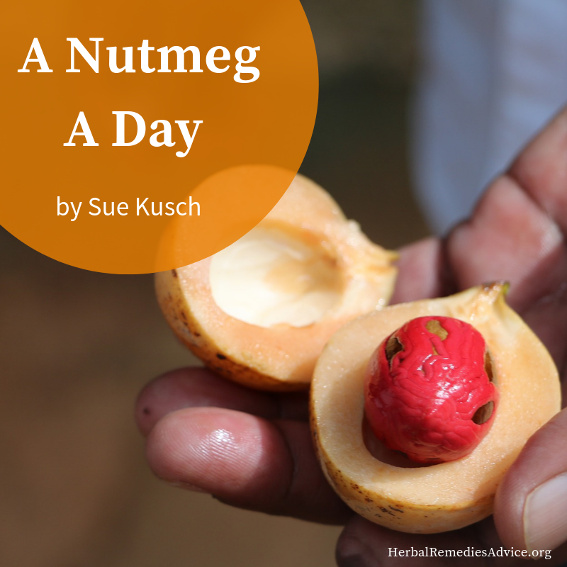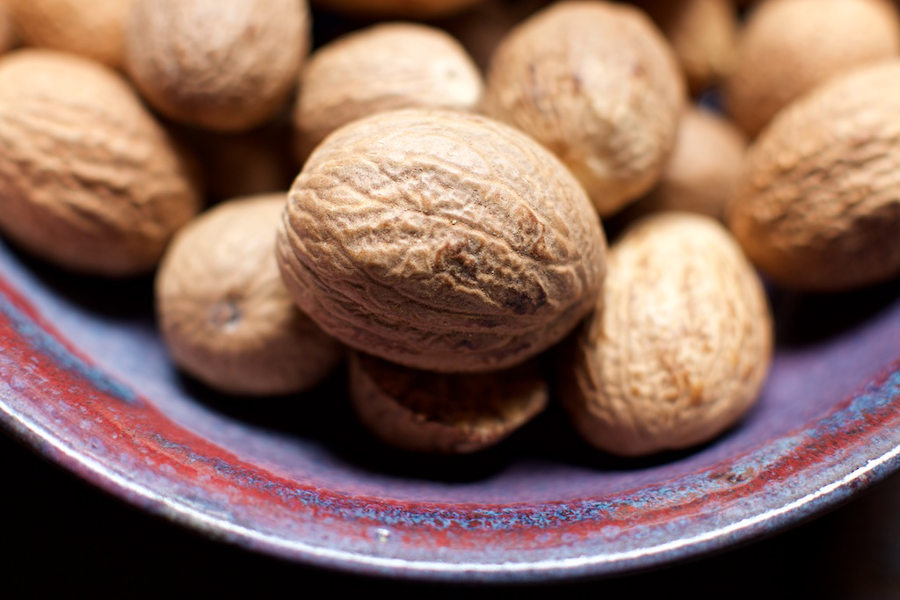Get weekly tips, recipes, and my Herbal Jumpstart e-course! Sign up for free today.

Nutmeg Uses
Share this! |
|
Nutmeg uses are generally confined to a light sprinkling on holiday drinks on in some seasonal baked goods. But is it something that can be included in a daily diet?
While researching various nutritional recommendations, I noticed that the daily amounts of vegetables and fruits varied from five to nine servings, depending on the source of the information. I did a quick mental calculation of my typical daily amount and then wondered how my daily intake of herbs and spices might count in my diet.
Given their phytonutrients and amazing medicinal properties, why isn’t there a Recommended Daily Allowance (RDA) for herbs and spices? How hard can it be to incorporate larger amounts of herbs and spices into our daily diets, not only for flavor but for specific medicinal and nutritive benefits? (HINT: it's actually very easy, as Rosalee demonstrates in her book, Alchemy of Herbs.)
Let’s consider nutmeg, a spice that is typically thought of as a seasonal ingredient. We dig it out of the back of our spice shelf and add it to pumpkin pie and breads in the autumn. We bring it back out to dust the tops of our holiday eggnog and add a pinch into cookies in the winter. And then we return it to the back of the spice shelf until the next year. Spices, in particular, have become a seasonal pleasure. This needs to change because many spices offer some of the most potent medicinal actions we have found in the plant kingdom.
What would an RDA of two grams of ground nutmeg a day do for the average person? Two grams of ground nutmeg is roughly equal to one whole nutmeg. (Always buy nutmeg as a whole spice and freshly grate as needed because its volatile oils can deteriorate quickly once ground.) A portion of that one gram could be used in savory dishes like a béchamel sauce and spinach lasagna, a cheesy quiche, a spicy curry or sprinkled over roasted or stir-fried vegetables.
Last evening, I roasted a large pan of cauliflower, Brussels sprouts, carrots, cabbage, sweet potato and onion, tossed with a simple balsamic vinegar and olive oil marinade, and then grated half of a nutmeg over the veggies. Nutmeg’s subtle earthy, slightly sweet flavor was the perfect topping.
Vegetable lovers know that there is a certain digestive side effect that accompanies vegetable eating. One of nutmeg’s most well-known benefits is its ability to soothe digestion complaints like bloating and gas. Delicious and helpful!
Nutmeg Uses: Nutmeg-Laced Creamed Spinach Recipe
A quick online recipe search revealed that nutmeg and spinach are a classic combination. Nutmeg-laced creamed spinach is a form of comfort food in my book! There are plenty of non-dairy recipes for wilted spinach with nutmeg and garlic. On my menu for the weekend is this simple spinach puree:
- Melt one tablespoon of butter in a large pan.
- Add a chopped leek and cook until soft.
- Add 3-4 cups of cleaned spinach and cook until wilted.
- Grate ½ of a whole nutmeg over the cooking spinach.
- Puree spinach mixture in a blender.
- Add a splash of lemon or white wine vinegar to the puree.
- Serve under a salmon or halibut steak or slathered on a piece of rustic bread.
More Nutmeg Uses
Spice blends like garam masala and Jamaican jerk seasoning offer another opportunity to include ground nutmeg. The French fell in love with nutmeg several hundred years ago and developed the Quatre Epices (Four Spices) blend, which includes ground white pepper, cloves, ginger and nutmeg. Traditionally, the blend was used to flavor meat dishes but is now sprinkled on a variety of dishes.
In the world of sweet things, it would be delightful to eat your RDA of nutmeg in a variety of desserts or snacks like stewed fruit, creamy custards and baked goods but it probably would not be the wisest choice.
If winter’s chill has you seeking warmth, you could add some of your RDA of nutmeg to a chai tea, a spiced hot chocolate or add to a mulling spice blend for cider or wine. Nutmeg is naturally warming and increases circulation, warming your body from the inside out.
One of the most interesting properties of nutmeg is its relaxing and sedative effects. Enjoying a cup of warmed milk with nutmeg can help you relax after a busy day. People who suffer from insomnia could utilize nutmeg in capsules, taken in a carefully timed schedule, to nurture the restful state of sleep. You can read more about this in Rosalee's nutmeg monograph. Nutmeg is a powerful spice and medicinal use should be discussed with an herbalist.

Sue Kusch, a former community college instructor and academic advisor, incorporates her experiential wisdom, expertise and science-based research garnered from her three decades of growing vegetables, fruit and herbs into her educational writing about plants and how people use them. In addition to her BA in Social Sciences and Masters in Education, she completed the Master Gardener training in 2011 and two permaculture courses in 2001 and 2014. She has studied medicinal and nutritional uses of herbs, including studies at Herbmentor and East West School of Planetary Herbology, since 1997. An avid reader, lover of historical and folkloric information, and a promising storyteller, Sue writes about the intersection of plants and people.

